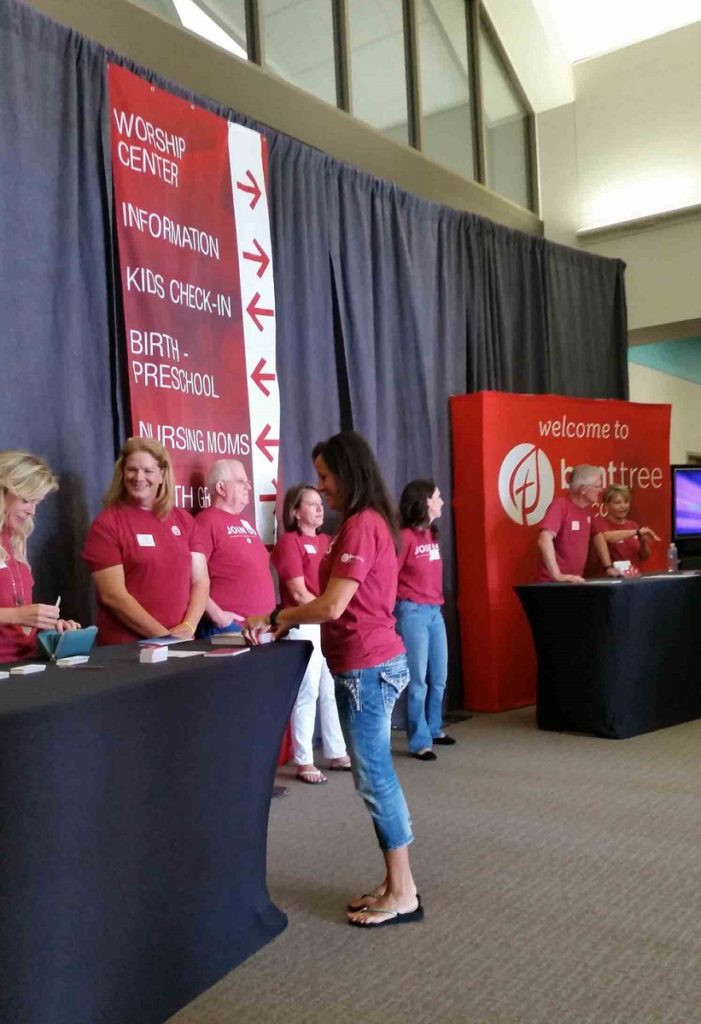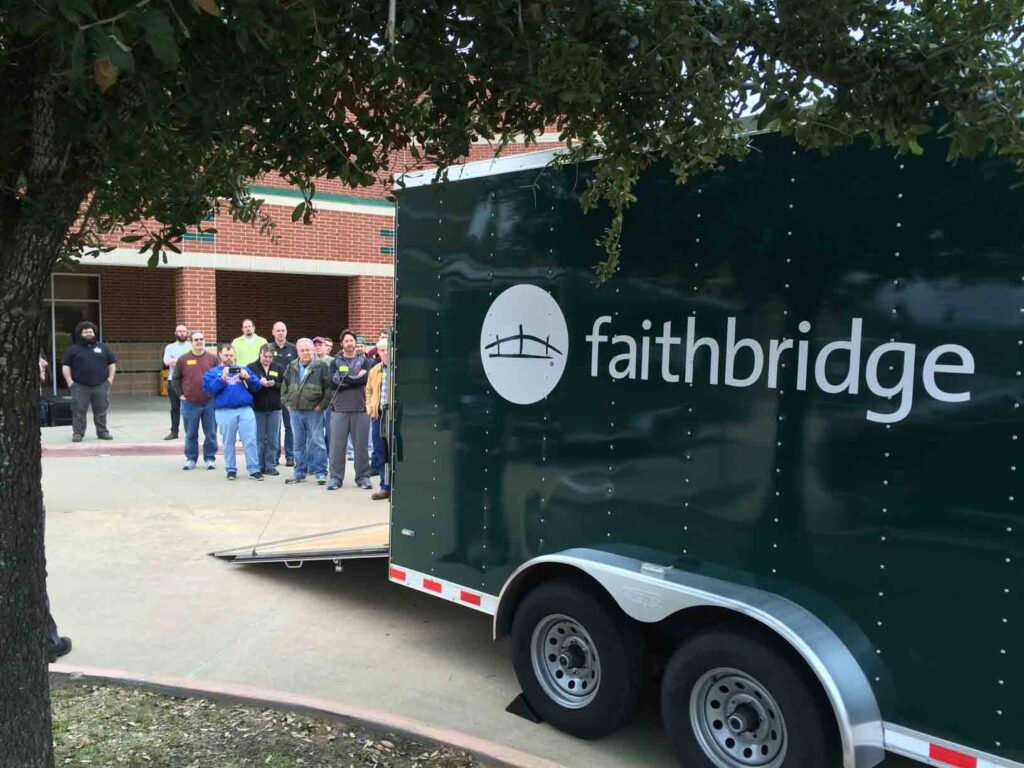As a portable church plant, you are probably going to launch in a rented, secular space like a school, theater, or community center. Is that a blessing or a curse?
Do you see opportunities or limitations?
Sometimes we meet leaders who see the permanent facility as the ultimate goal and portability as the means to the end. To them, portability is a problem.
To others who have seen the fruit of portability – particularly as it relates to volunteers and creating community, they see it as an opportunity and a blessing.
The difference between a problem and an opportunity is what we do with it, not what we think the issue is to begin with.
Let’s explore five reasons a portable environment can have a positive impact on your church, particularly your volunteers.

5 Ways a Portable Environment Can Have a Positive Volunteer Impact
1. Creates a positive climate
Setting up and tearing down a portable church is a beautiful opportunity for spreading positivity.
With an army of invested individuals in the leaders’ presence, all on mission together, setup and teardown time is the perfect opportunity to celebrate their dedication and call attention to the results of their work.
For example, upon arrival on an early Sunday morning, read a thank-you note from a parent who is grateful for the loving volunteers in the kids’ ministry, or recount a story of a family who never thought they’d step foot in a church and yet have been happily attending for 6 months.
These praise reports will energize volunteers and give them yet another reason to celebrate their sacrifice and dedication.
Check out our before and after gallery to see what volunteers can do!
2. Creates community
In many churches, we’ve seen portable teams become a de facto men’s ministry.
With many men on setup and teardown teams, a community forms where men come to serve together and connect regularly.
A lot of pastors report they find men are more likely to attend church because they’ve been given jobs and a purpose and connections are a positive byproduct.
What churches find is that inviting men – even marginal attenders – into the volunteer army results in growth and transformation.
Portable churches have seen their setup and teardown teams, largely filled by men, become a de facto men’s ministry. There’s consistency, community, mission, and a purpose in serving. Click To Tweet3. Builds vision
Who better to grasp the leadership’s vision of creating an inviting environment for everyone attending than the workers?
- If chairs are broken or in poor condition, it’s the setup team who will consider the visitor’s comfort and take action to remove or repair that equipment.
- When lobbies are muddy and uninviting, it’s the hospitality team who finds every way possible to remedy the situation and make it inviting to the visitors and attendees.
- If kids’ ministry supplies have been misplaced, the volunteers will be the first to run to a local store and grab what’s needed in the name of creating a fun and caring environment for the children.
Invested volunteers are a church’s best line of protection against letting things slide and forgetting about the mission and vision. They’re INVESTED.
Who’s more invested in your church’s vision and mission than your setup and teardown volunteer army? Who’s going to make sure that broken chair gets repaired? Who's doing one last tidy in the lobby? Volunteers ROCK. Click To Tweet4. Keeps leaders humble
Of course, a pastor knows he can’t physically set up and tear down alone. But the volunteers are, undoubtedly, the biggest asset of a portable church plant, and it only takes a moment to see why. In other words, it takes a village.
In fact, on their blog, Life.Church says it outright: Life.Church couldn’t operate without volunteers.
Taking good care of that village requires selflessness and planning on the part of the leaders. Instead of figuring it out as they go along or being so concerned with the budget that volunteers are inconvenienced, it’s critical to show appreciation and consideration for the volunteers.
In a previous article entitled Volunteers are Your Most Valuable Asset, we suggest that pastors open the door to feedback, even if it is humbling.
“We want to make sure your volunteers feel empowered – give them a feedback loop to share their insights and make sure Shepherding Methods are employed to encourage, affirm and uplift your volunteers. A little emotional care goes a long way in a portable environment!”
It might be easy to assume the group of workers is fine since they’re usually enthusiastic workers, but this feedback loop allows them to share their honest reflections from their time in the trenches.
More on volunteers: Empower Your Volunteers and Avoid Burnout

5. Normalizes service
Serving can have a contagious quality, especially if it’s viewed positively.
When a church launches with 50 dedicated, invested workers, there’s no doubt their impact will spread. The question becomes what are they spreading?
In other words, are the volunteers overworked and underappreciated and asked to maneuver and set up cumbersome equipment as part of a tedious system? Or have the workers been shown gratitude and respect – with plenty of thank-yous and the blessing of intuitive equipment that can be assembled quickly?
Happy volunteers who are experiencing purpose and community will recruit more volunteers who will experience purpose and community. Serving becomes part of the culture, along with all the benefits listed above.
Here’s how one pastor put it:
“We have more people engaged and involved than ever before, and the Setup and Teardown process has really been the catalyst for that.” Ryan Ezekiel King, River City Church
Visit our store for tested and approved portable equipment.
GRATITUDE FOR VOLUNTEERS
Though some leaders are initially intimidated by the need for an eager team of workers, we’ve seen time and time again how these groups become the backbone of a church’s congregation. They are the hub of community and positivity, they are forces on a mission, and they make service fun and approachable.
We’re thankful for the workers who make portable churches function well and for the pastors who’ve embraced the positive impact of these volunteers on their church community.
































































